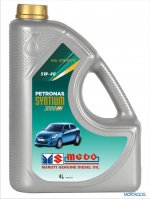Pyabbi
New member
- Joined
- Aug 26, 2018
- Messages
- 55
- Points
- 17
Hi folks!
I recently changed my cars engine oil, I was trying to find PETRONAS Selenia K but couldn’t since, rather than ordering online and waiting for long.
I decided to use a Diesel engine oil, designed for Maruti Suzuki Swift(which uses a Fiat 1.3 M-Jet engine) by PETRONAS.
I spoke to my cousin who is a service advisor at Toyota and informed that it’s a fully synthetic oil anyway and diesel and petrol it’s works for both regardless they saying it’s designed for Swift(i was imagining it’s a branding for folks to just tell them you don’t know you drive a fiat) [emoji12]
So, now I am thinking will it make any difference? I read online and learnt Diesel engine oils are better anyway they handle heat better and also keep engines cleaner.
Was hoping if anyone of you ever used it ?
My cars ODO is 57000 kms, should I switch to Selenia or it won’t harm the engine at all. I saw black grease inside the cars engine where we add oil, I was abit shocked can petrol cars have that ?
Also, do petrol cars heat up more if diesel? The guy who changed my oil had a tough time removing the oil filter, he was like petrol cars heat up too much so it was jammed but am just confused listening to him and reading online.
Also, please share your thoughts about engine flush, if works ? Do you recommend even if it works ?
I did only once and that too when my dad didn’t change the oil for long there was less oil and more grease when they tried changing oil.
So I bought 2 litres of cheap oil and added a 1 litre engine flush and ran engine for like 10-15 minutes, then the oil was black as Batman’s dark night.
That was 23000 km, to now it’s 57000 km
I recently changed my cars engine oil, I was trying to find PETRONAS Selenia K but couldn’t since, rather than ordering online and waiting for long.
I decided to use a Diesel engine oil, designed for Maruti Suzuki Swift(which uses a Fiat 1.3 M-Jet engine) by PETRONAS.
I spoke to my cousin who is a service advisor at Toyota and informed that it’s a fully synthetic oil anyway and diesel and petrol it’s works for both regardless they saying it’s designed for Swift(i was imagining it’s a branding for folks to just tell them you don’t know you drive a fiat) [emoji12]
So, now I am thinking will it make any difference? I read online and learnt Diesel engine oils are better anyway they handle heat better and also keep engines cleaner.
Was hoping if anyone of you ever used it ?
My cars ODO is 57000 kms, should I switch to Selenia or it won’t harm the engine at all. I saw black grease inside the cars engine where we add oil, I was abit shocked can petrol cars have that ?
Also, do petrol cars heat up more if diesel? The guy who changed my oil had a tough time removing the oil filter, he was like petrol cars heat up too much so it was jammed but am just confused listening to him and reading online.
Also, please share your thoughts about engine flush, if works ? Do you recommend even if it works ?
I did only once and that too when my dad didn’t change the oil for long there was less oil and more grease when they tried changing oil.
So I bought 2 litres of cheap oil and added a 1 litre engine flush and ran engine for like 10-15 minutes, then the oil was black as Batman’s dark night.
That was 23000 km, to now it’s 57000 km


